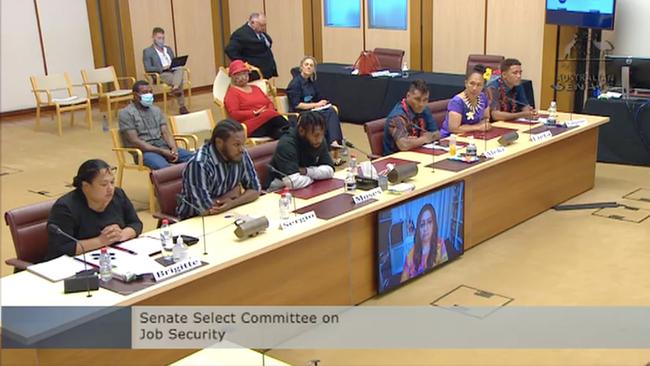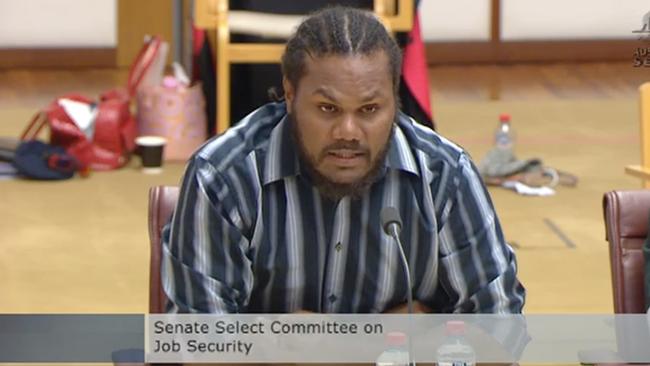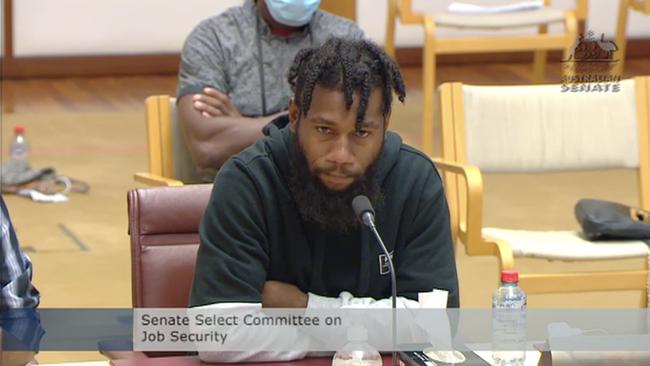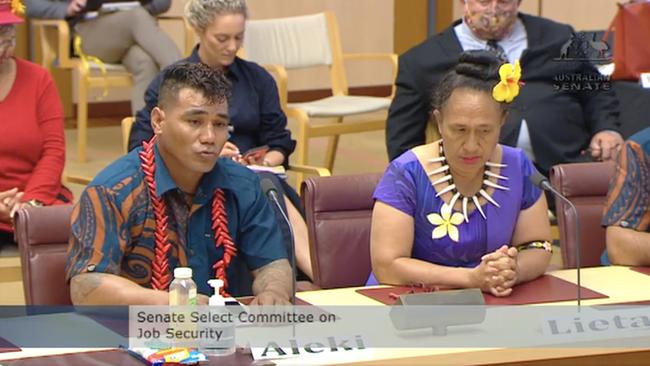MADEC Australia named in worker pay scandal
Labour hire company MADEC Australia has denied allegations it paid a farm worker just $70 for a week’s work picking grapes in Mildura.

One of Australia’s largest labour hire companies has been named in a Senate hearing yesterday by seasonal workers who say they were paid as little as $70 for a week’s work.
In evidence given to the Senate Select Committee into Job Security on Wednesday, worker Sergio, who was identified only by his first name for safety reasons, said labour hire company MADEC Australia paid him only $70 for a week’s work picking grapes in Mildura, in northwest Victoria.
MADEC Australia, one of about 70 labour hire companies participating in the Australian government’s Pacific Australia Labour Mobility scheme, arranges travel and accommodation for workers it hires out to farms in Victoria, South Australia, New South Wales and Queensland.
Sergio, a Vanuatu national, told the committee he arrived in Australia in 2019 and was told he would be paid a piece rate of $2.50 per box picking grapes.
He said he picked on average 110 boxes per day, equal to weekly earnings of $1375 for five days’ work, but some weeks received only $100 pay. On at least one occasion, he said he checked his bank balance to find he had been paid just $70 for the week.
Sergio said he asked MADEC why the company was deducting money from his pay but did not get a response.
“I always ask MADEC to give me the breakdown for the deduction, but he didn’t,” he said.
“After four month(s) I feel very upset,” he said.
Sergio said he and other workers from Vanuatu decided to stop work and contact authorities about their situation.
“We stay at home for one week, no food, and I call(ed) the union to come and help us to pay (for) the food,” he said.
He said MADEC asked the workers to return to work but he refused, telling the company he was in Australia to work for money, not to be “a slave”.

A second worker from Vanuatu, Moses, who worked with Sergio, told the hearing he, Sergio and other workers absconded from their employer because they did not feel they were treated fairly.
“If you walk around the supermarket you can see lots of goods, fruits, it is because of us. We contribute a lot in this economy. We need fairness,” he said.

MADEC responds
MADEC chief executive Laurence Burt said he was “not in a position to make a comment on that specific case (of workers Sergio and Moses)”, but he said he disputed the evidence given by the workers.
“I couldn't fathom why he (Sergio) would only be getting that much money each week for four months. It's not possible,” he said.
Mr Burt said it was possible for a MADEC worker to receive only $100 pay for a week after deductions in 2019 while they paid off costs including the cost of their flight into Australia, but he said those rates would not continue for a period as long as four months.
He said MADEC ensured workers would not receive less than $100 at the time, and that figure had now risen to $150 to make sure workers had cash available to purchase food and other basics.
Upfront costs for bringing a worker in to Australia varied depending on the country the worker was from, but may cost around $2000 per worker, he said.
Mr Burt said these costs were normally recovered in the first six to 10 weeks of a worker arriving and starting work.
In addition to the cost of travel to Australia, Mr Burt said MADEC paid for workers' basic living costs and passed those costs on to the workers without making a profit. He said workers were typically charged less than $220 per week each for accommodation and utilities, about $50 each per week for transport to and from their work site, and private health insurance of about $20 per week.
Mr Burt said deductions from workers’ pay were “consistently a point of contention” between workers and their employers in the PALM scheme, but MADEC did its best to communicate clearly why deductions were made.
“Deductions are detailed on payslips provided to workers every week and they are given further information if they seek clarification,” he said.
“We go to great lengths when workers raise those issues with us to explain what those deductions are for any why they might have changed week to week.”
‘Not just a few bad eggs’
Australian Workers’ Union National Secretary Daniel Walton told the Senate committee underpayment of workers on temporary visas was “systemic” in the horticulture industry.
“This is not just a few bad eggs. The Fair Work Ombudsman investigated hundreds of employers over five years in its Harvest Trail inquiry; more than half of its investigations found a breach of workplace laws. Three-quarters of these breaches involved underpayment,” he said.
“Since 2016, 11 different pieces of research have investigated exploitation of horticulture workers … and they have all come back with the same findings: underpayment, mistreatment, shocking conditions and exploitation are systemic,” Mr Walton said.
In November, the Fair Work Commission announced farm workers would be paid a guaranteed minimum hourly rate from April 28.

Calls for change to the seasonal worker program
Seasonal workers speaking at yesterday’s senate hearing called on the government to allow them to change employer if they weren’t happy with their conditions, while employers called for tougher penalties for workers who leave their jobs.
Two workers from Samoa, speaking at the senate hearing, begged the Australian government to allow them to change employer.
Worker Aleki said he and other Samoan workers had been paid barely enough to feed themselves while working on a farm at Warburton, in Victoria’s Yarra Ranges, and were forced to live four to a small room with no fan or airconditioning.
“I’m here today begging you, that please, if there is any chance that we could change employers or change somewhere else for us to go so that we could somehow better our conditions and get some more money to send back to our families and look after ourselves here in Australia,” Aleki said.
Aleki said he signed a contract in Samoa that guaranteed an hourly rate of $25.41 per hour, but when he and other workers arrived at the farm in Warburton, they were told by the farm owner they would be paid a piece rate.
“We realised that not only was the condition at the farm appalling, but there were a lot of deductions (made from our pay), and there wasn’t a lot left after all the deductions that were made,” he said through an interpreter.
“I have eight children, I look after my parents, and my family. I have absolutely not enough money earning here in Australia to support my family back home,” he said.
Meanwhile employers have called for tougher penalties for workers on the PALM scheme who quit their jobs before their contract is over.
MADEC chief executive Laurence Burt said seasonal workers absconding from their jobs in Australia was increasingly “a major issue” the government needed to resolve.
Mr Burt said MADEC, which employs about 2500 workers nationwide, had had more than 500 seasonal workers abscond over the past two years, sometimes before they had repaid the cost of their travel to Australia.
He said the issue wasn’t isolated to any one employer.
“Seasonal workers absconding is a major issue,” Mr Burt said. “It has cost employers like MADEC millions.”
Mr Burt said he accepted that workers should be free to leave their employer if they weren’t happy with their conditions, but he said the Seasonal Worker Program must change to ensure they repay the cost of their arrival into the country if they do leave.
Calls for tougher penalties also came from two meat processing businesses, who spoke to The Weekly Times in January. The companies – HW Greenham and Sons and Gundagai Meat Processors – called for seasonal workers to be deported if they absconded from their employers after the two employers lost dozens of workers over a six-month period.
Under the terms of the government's Seasonal Worker Program, Pacific Island workers are required to work for the same employer for the duration of their stay in Australia.
In a statement this month, a spokesperson for the Australian Border Force said the department works to reconnect absconded workers with the Seasonal Worker Program, and will deport them if the worker commits “additional offences”.
If the ABF or its partner agencies identify workers who have absconded from their employers, their first approach is “education”, followed by “referral to the visa sponsoring agency for reconnection into the program under the previous or a new approved employer”, a Border Force spokesperson said.
“If additional offences are identified, absconders may be referred to the Department of Home Affairs for visa cancellation consideration. Seasonal workers who have had their visa cancelled by the Department will be liable for removal from Australia,” the spokesperson said.
The spokesperson encouraged any workers, regardless of their visa status, who believed they were being exploited, “to come forward and provide information so that action can be taken against those involved in these practices”.





